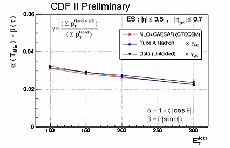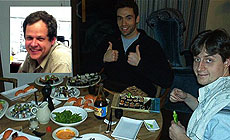Studying shapes to understand color

The thrust event-shape observable for different transverse jet energy. The theory predictions for this variable are in good agreement with the CDF data.
When scientists collide protons and antiprotons at the Tevatron, they also are colliding quarks and gluons, the tiny particles that make up the protons and antiprotons. These fundamental particles are unique within the Standard Model because they are the only carriers of the color charge.
Usually, particles carry a positive or negative electric charge. But in quantum chromodynamics, three kinds of charges exist, referred to by a loose analogy as the three base colors: red, green and blue.
As carriers of the color charge, quarks and gluons are the only particles in the Standard Model to interact with the strong force. While the majority of events at the Tevatron are born from strong interactions, studying this force in detail remains a significant challenge.
For one thing, the strength of the interactions makes theoretical calculations notoriously difficult. More critical, though, is the fact that scientists have never observed isolated quarks. Instead, observable particles only exist as bound states of either two or three quarks where the color charge cancels. As a result, in order to study the strong interactions, physicists need to design a way to make measurements, called observables, based on final-state particles that are capable of probing the underlying QCD nature (color) of the collisions.
Scientists call one such class of observables event shapes. In general, event shapes are variables that describe geometric properties of the way particles are distributed after a collision. Quite literally, they describe the shape of an event. One can imagine any number of such variables; however, only a very few number of them can be calculated using perturbative QCD, the theory that best describes our understanding of the strong interactions.
At the Tevatron, one event-shape observable that was singled out for study is called the thrust, defined as a linear sum over the transverse momentum of particles in the final state. One can think of the thrust observables as a measure of how columnated or pencil-like the particles in an event are distributed. In contrast, another event-shape variable called 'sphericity' is a measure of the spherical symmetry of the distribution of particles in an event.
A direct comparison to theory was difficult due to the limitations of the theoretical calculations to include all aspects of the hadron collider environment. In addition, detector effects distort measurements with standard event-shape variables. Nevertheless, CDF scientists were able to construct auxiliary event-shape observables that were not affected by these issues. Their results indicate the latest QCD predictions of event shapes at a hadron collider agree well with data.
-- edited by Craig Group

When they are not eating sushi, these CDF scientists use event shapes variables to study the color charge of QCD. From left to right: Andrey Korytov and Lester Pinera, University of Florida; and Sergo Jindariani, Fermilab.
|